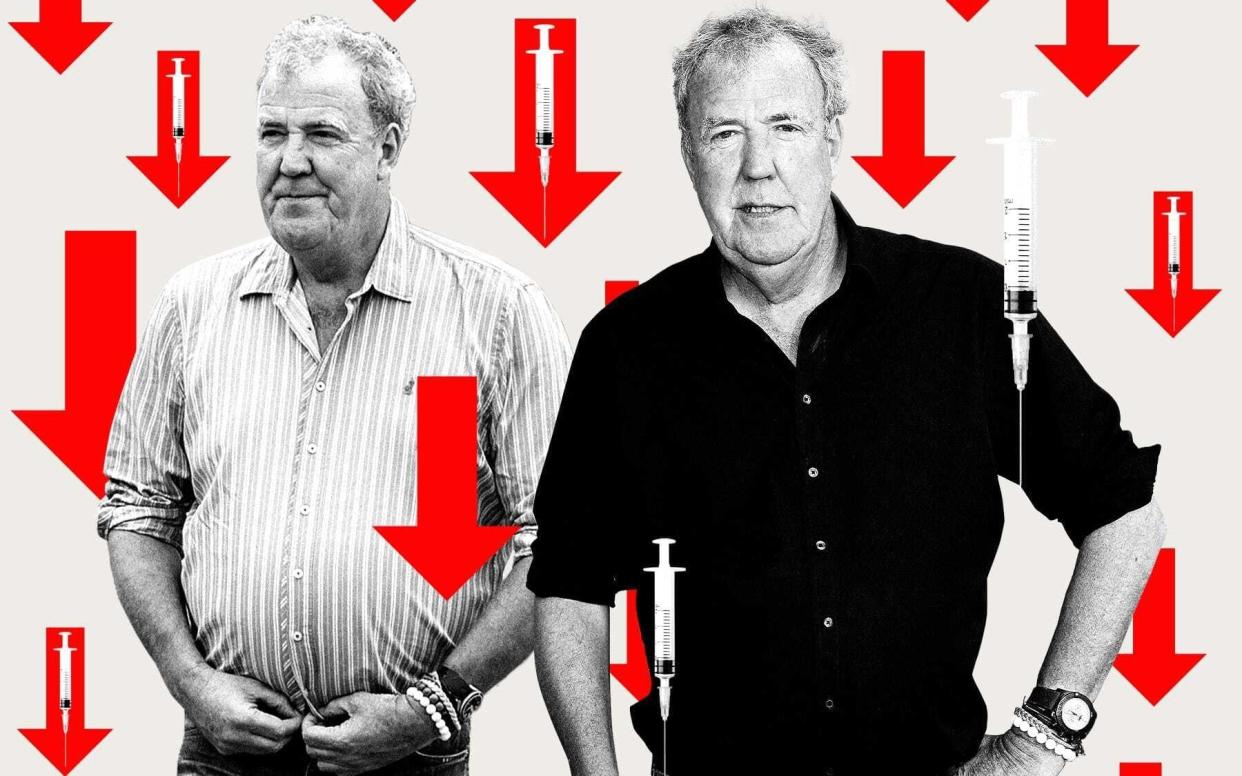Half the men I know are using Ozempic to lose weight – the signs are hard to miss

“Trust me: by this time next year, everyone you know will be on this drug.” It was a bold claim, made by a well-known LA designer at a supper last February. Although I nodded along – even getting her to spell out the name of the wonder weight-loss jab I’d never heard of – inside, I was scoffing.
How wrong I was. Although the designer’s claim did turn out to be a tad overblown. Thirteen months later, I’d estimate that at least 50 per cent of the over-45s I know in London are on Ozempic, Wegovy or Rybelsus – all brand names for semaglutide, a hormone released by the body when we eat, stimulating insulin. And here’s the curious thing: most of them are men.
How do I know this? Because unlike women, men admit to it. They’ll even volunteer the fact. In January, Elon Musk told his Twitter followers that the drug had helped him lose 30lbs, and Jeremy Clarkson also opened up about his experience with Ozempic. And just last week a conversation with one of my best male friends went like this. “Wow – you’ve lost so much weight!”; “16lbs. Ozempic. Obvi.”
Then there is my husband, who has recently lost 14lbs on a wacky diet that involves not putting as much in his mouth, but who now gets a pointed finger at the belly region and the one-word question: “Ozempic?”, from men at every social occasion we go to.
The official page for Ozempic will tell you in the bullet points at the top: “Ozempic is not for weight loss”, so why do you think the company feels it’s important to stipulate that? I’ll give you a hint: it’s not because it doesn’t help people lose weight. The drug was designed to help the very overweight get to a healthier weight – not for slim healthy people to lose those last few pounds for summer.
Semaglutide was approved for use on the NHS only for the clinically obese – unlike in LA, where I’ve just returned from, our high-minded medical establishments do not hand out powerful weight-loss drugs like Smarties.
However, it is clearly now being prescribed here by some private doctors to people who are absolutely not obese. Equally unscrupulous dealers on sites such as eBay and Instagram are also reportedly selling the drug to anorexia and bulimia sufferers, desperate to find out whether the magic shot lives up to its hype.
It does. I’ve never seen people lose as much weight, as fast, as they do on Ozempic. At a recent dinner party, I looked around the table trying to work out what was jarring before realising that while the women looked perfectly normal, every man there looked like a deflated balloon.
It was like someone had routed around, found the nozzle on their coccyx, let all the air out and then stamped on their shrunken carcasses just to make sure there were no distended bits left. Or, you know, in Tom and Jerry when one or the other gets steamrollered and has to peel his newly 3mm-thin body up off the ground. That’s what Ozempic Man looks like.
There’s even a phenomenon called “Ozempic face” – coming to a British male face near you. US cosmetic surgeons are already familiar with it. Ozempic causes weight loss in the cheeks too – and it turns out that we’re not so keen on our faces looking like human potpourri. So the Ozempians are having their gaunt visages plumped out with yet more injectables.
Personally, I find the prospect of a world filled with pufferfish-faced, spilikin-bodied men alarming. More importantly, I’m worried that the misuse of this drug (because to be clear, it is being misused) is particularly appealing to men. Women of my generation may have wasted decades obsessing about their weight before eventually coming to the realisation that any quick fix or magic button will come back to bite your bitty behind, but many men haven’t understood that yet.
They’re competitive creatures, as we know, and they seem to like the straightforwardness of a drug that simply stops you from feeling hungry. This is crucial when you consider that no man has ever felt comfortable saying they were “on a diet”. It’s not a cool thing to admit to whatever your gender, and it’s certainly not macho. But if Elon takes it, then it must be “next level”.
Indeed, given how much you hear the brand name being bandied about in the US, you would be forgiven for thinking that Gen-Z men are obsessed with the weight-loss drug, too. They’re not, as far as I know. No, according to the Urban Dictionary, young people are using it as effusive slang. It’s not a “great pic” of you on the beach on Instagram, but “an Ozempic”.
This is worrying, although not as worrying as the idea of what’s going to happen to all these men and women when (and if) they ever go off the wonder drug.
If you’ve seen the 1990s drama, The Awakenings, then perhaps you are picturing the same thing I am: rooms filled with fat, miserable zombies who are unable to shift a single pound ever again.

